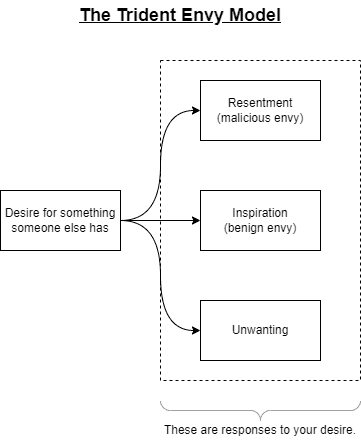“Stop being envious, or you’re not going to make it.”
“Stop hating on another’s success. Start being happy for them.”
“Learn to be happy for another’s success.”
All these statements have their merits, but if their goal is to make people feel less envious, they’re terrible. They’re unpersuasive.
If getting people to stop feeling a certain way were as simple as telling them to stop it, then it would be just as easy to get them to start feeling a certain way. You may as well just tell them to “start being happy.” Then, they’ll be happy all the time. They’ll never feel envy.
Of course, human beings don’t work that way.
I wanted to find a better way to deal with envy. So, my first goal was to find out: what is envy? I was surprised to find slightly different definitions.
What is Envy?
Some definitions described envy as “the feeling that you wish you had something that someone else has”.
Other definitions described envy more as “a feeling of discontent or covetousness with regard to another’s advantages, success, possessions, etc.”.
There’s a critical distinction between the two definitions: one is focused on the desire for something, while the other is focused on a consequence of that desire. Before we dive deeper into the importance of this distinction, it’s worth noting that some sources also distinguish between two different types of envy:
- Malicious envy which relates to resentment
- Benign envy which relates to inspiration
What those sources don’t tell you is that these aren’t separate concepts. In fact, keeping them separate makes envy harder to understand. In reality, they have a common root cause. They’re all related. Here’s how:
The Trident Envy Model
Envy is rooted in the desire for something someone else has. There are ways to manage this desire that may involve deep self-reflections beyond the scope of this post. The other way to deal with envy is to manage your responses to it, including: resentment, inspiration, and unwanting.
Resentment (also known as, “malicious envy”) typically arises when you feel like you can’t get what someone else has. So, you don’t want them to have it either. Wishing others ill will doesn’t really benefit you, though. Worse still, believing that you can’t attain something someone else has withholds you from success. So, you remain trapped.
Inspiration (also known as, “benign envy”) comes from the same desire for something someone else has. In this case, however, you believe that you can have what they have. That’s right. The critical element that keeps you from potentially getting what another has, is whether you believe you can attain it.
Unwanting is a third option that only becomes apparent with this model of envy. You may decide that you don’t want what another person has after all. Then, the desire and its envy disappear. I knew kids who wanted to become famous movie stars, envious of those who became famous at an early age. Then, they found out what life was like behind the scenes, and they didn’t want fame anymore.
Take Action
So, the next time you feel resentment from envy, first ask yourself:
“Do I really want what this other person has?”
Because maybe you don’t.
If you do, determine how you’re going to get it, and work hard towards it. Others become inspirations - they provide concrete visions of what’s possible for you. Working on it and observing your progress gives you confidence that reinforces your belief that you can do it.
One caveat, though: be careful not to let another person’s success limit your own vision for success. When you rely on another person’s success as inspiration, it’s easy to limit the vision of success for yourself only to what the other person attained. You can attain different and greater things than what someone else has.
No one needs to be told to “stop hating someone else’s success” because it’s ineffective. Sometimes, people just need a reminder that they’re more capable than they think.
